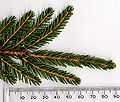Picea orientalis
| Picea orientalis | |
|---|---|

| |
| Scientific classification | |
| Kingdom: | Plantae |
| Clade: | Tracheophytes |
| Clade: | Gymnospermae |
| Division: | Pinophyta |
| Class: | Pinopsida |
| Order: | Pinales |
| Family: | Pinaceae |
| Genus: | Picea |
| Species: | P. orientalis
|
| Binomial name | |
| Picea orientalis | |

| |
Picea orientalis, commonly known as the Oriental spruce[2] or Caucasian spruce, is a species of spruce native to the Caucasus and adjacent northeast Turkey.
Description
[edit]It is a large coniferous evergreen tree growing to 30–45 m tall or 98–145 feet (exceptionally to 57 m), and with a trunk diameter of up to 1.5 m (exceptionally up to 4 m). The Caucasian Spruce can also be found in Northern Iran, though its numbers have decreased due to deforestation.[citation needed]
The shoots are buff-brown and moderately pubescent (hairy). The leaves are needle-like, the shortest of any spruce, 6–8 mm long, rhombic in cross-section, dark green with inconspicuous stomatal lines. The cones are slender cylindric-conic, 5–9 cm long and 1.5 cm broad, red to purple when young, maturing dark brown 5–7 months after pollination, and have stiff, smoothly rounded scales.
Cultivation
[edit]It is a popular ornamental tree in large gardens, valued in northern Europe and the USA for its attractive foliage and ability to grow on a wide range of soils. It is also grown to a small extent in forestry for Christmas trees, timber and paper production, though its slower growth compared to Norway spruce reduces its importance outside of its native range. P. orientalis[3] and the cultivars 'Aurea' [4] and ‘Skylands’[5] have gained the Royal Horticultural Society's Award of Garden Merit.[6] A frequently seen ornamental cultivar is Picea orientalis 'Aureospicata', which has gold-coloured young foliage in the spring.
-
Foliage
-
Cones
-
Male cones of var 'aurea'
References
[edit]- ^ Farjon, A. (2013). "Picea orientalis". IUCN Red List of Threatened Species. 2013: e.T42332A2973275. doi:10.2305/IUCN.UK.2013-1.RLTS.T42332A2973275.en. Retrieved 19 November 2021.
- ^ BSBI List 2007 (xls). Botanical Society of Britain and Ireland. Archived from the original (xls) on 2015-06-26. Retrieved 2014-10-17.
- ^ "RHS Plant Selector - Picea orientalis". Retrieved 6 February 2021.
- ^ "Picea orientalis 'Aurea'". RHS. Retrieved 18 January 2021.
- ^ "RHS Plantfinder - Picea orientalis 'Skylands'". Retrieved 25 April 2018.
- ^ "AGM Plants - Ornamental" (PDF). Royal Horticultural Society. July 2017. p. 78. Retrieved 25 April 2018.
External links
[edit]- Gymnosperm Database
- Picea orientalis - information, genetic conservation units and related resources. European Forest Genetic Resources Programme (EUFORGEN)





